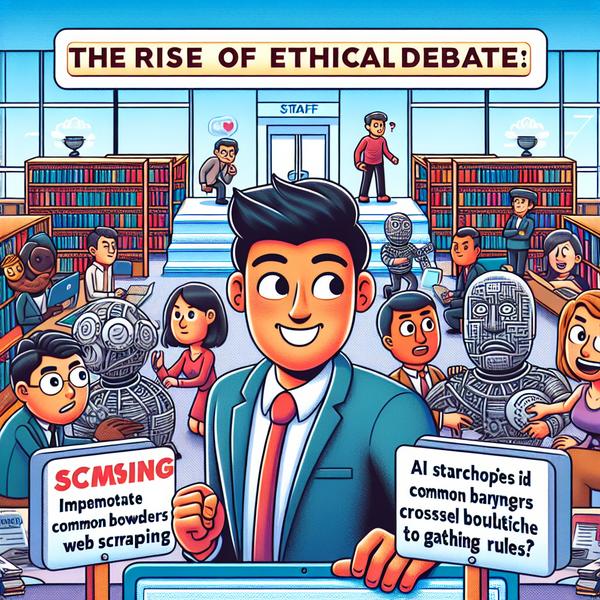
The digital world is witnessing a heated debate over ethical AI practices, following a controversial exposé by Cloudflare on Perplexity AI. Cloudflare accuses the AI startup of bypassing website restrictions and using hidden methods to scrape data, challenging the long-standing "gentleman's agreement" of respecting robots.txt files. This clash raises questions about data transparency, compliance, and the future monetization of online content as companies like Cloudflare push for paid access through marketplaces like "Pay Per Crawl." Meanwhile, Perplexity defends its actions as being user-driven rather than autonomous. This conflict emphasizes a larger shift in the internet's business model, with data partnerships and accountability shaping the evolving digital landscape.
1. The Rise of AI Web Scraping and Controversy Unveiled
- AI-driven technologies like scrapers are increasingly being used by startups such as Perplexity AI to gather valuable online public content for training their algorithms.
- However, Cloudflare’s report has ignited a storm, revealing how Perplexity allegedly camouflages its scraping attempts by mimicking common browsers like Google Chrome through user agent spoofing.
- This practice is perceived by many as a violation of trust between webmasters and organizations relying on the age-old robots.txt convention to block unwanted data extraction.
- Imagine a library that politely displays "Staff Only" signs, but some people keep sneaking in disguised as regular visitors. This is what the digital world faces with Perplexity’s alleged techniques.
- The issue brings into focus a larger implication: what would it mean if the web became fragmented behind paywalls or blocked access for AI applications?
2. The Ethical Dilemma: Bypassing Robots.txt Agreements
- Websites have long relied on robots.txt agreements, equivalent to a "Do Not Enter" sign for bots, to manage access control.
- These informal agreements aren’t enforced by law in most jurisdictions but are a respected standard followed diligently by major AI companies like OpenAI and Anthropic.
- Cloudflare criticizes Perplexity for breaking this trust, using tactics like applying rotating systems (ASNs) to access the forbidden data.
- This ethical dilemma is much like someone skipping a restaurant queue while others follow the rules. While not strictly illegal, it sparks debates about fairness and transparency.
- It highlights an industry-wide need for better-defined best practices when it comes to data scraping technologies and content usage rights.
3. Cloudflare’s "Pay Per Crawl": A Game-Changer or a Gatekeeper?
- In response to scraper-related challenges, Cloudflare introduced "Pay Per Crawl," a marketplace that allows publishers to monetize access by charging bots for content scraping privileges.
- This model has quickly gained traction with heavyweights in publishing, from Time Inc. to BuzzFeed, actively participating to protect their business models.
- Over 2.5 million websites are now leveraging advanced block systems provided by Cloudflare to stop unauthorized AI scraping from impacting their data sources.
- Think of this as an airport introducing VIP services: entry requires either special permission or a fee, and without either, entry is denied by default.
- This represents the beginning of a seismic shift in how online content is shared and while it protects publishers, it also creates barriers for smaller AI firms that lack the financial heft of larger players.
4. Perplexity's Defense: Human vs. AI Actions
- Perplexity AI, on the other hand, denies Cloudflare's claims, asserting that much of the traffic flagged as "scraping" originates from human-driven queries through its platform.
- The company compares this to a public museum; a visitor viewing artwork via a smartphone app doesn’t make the app the violator. Instead, the user is simply accessing public content.
- They also noted past accusations of plagiarism, blaming ambiguity in defining acceptable content usage as the root cause.
- This raises a philosophical point: Can we view intelligent AI bots assisting human users as an extension of individual browsing, or should they be held independently accountable?
- Perplexity’s response brings attention to inconsistent industry standards and the urgent need for dialogue on balancing innovation with responsibility.
5. The Dawn of a Paid Data Age
- The ultimate takeaway from this duel is the clear signs of a paradigm shift. Free-flowing data access on the internet as we know it is becoming a thing of the past.
- Transparency, accountability, and monetization are reshaping how companies interact with the web, with data partnerships taking center stage over stealthy scraping mechanisms.
- For AI players to remain competitive, reliance on secure and ethical licensing measures, similar to Spotify's model for music, will become necessary.
- The internet may not become inaccessible, but akin to premium cable packages, there will likely be tiers or access levels based on advanced permissions and agreements.
- This transformation highlights how critical ethics and sustainable systems are in ensuring the digital ecosystem thrives while staying fair for all stakeholders.